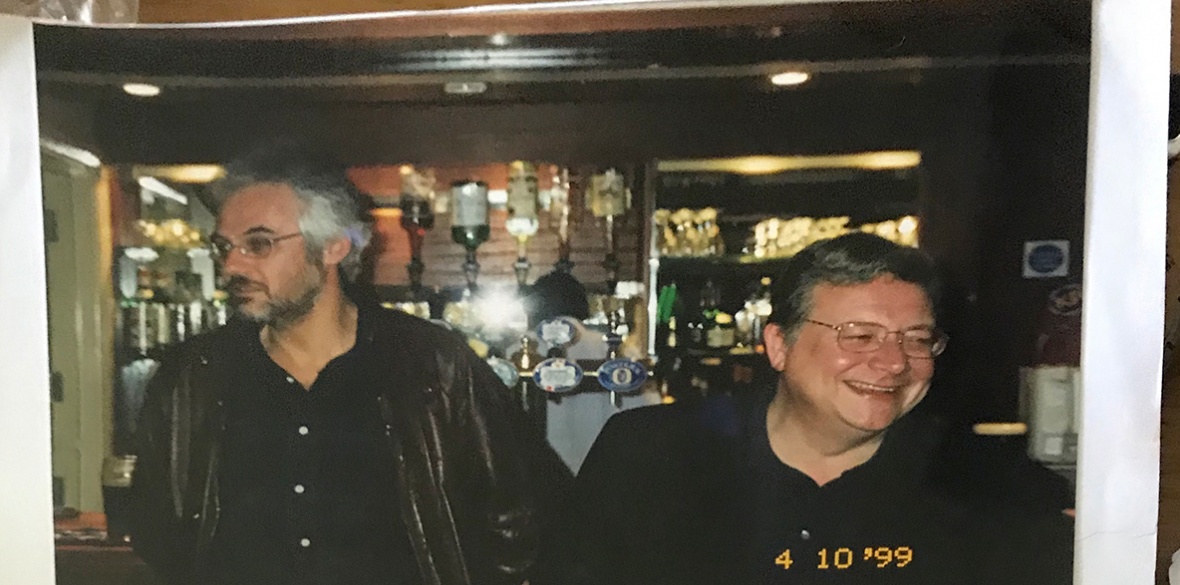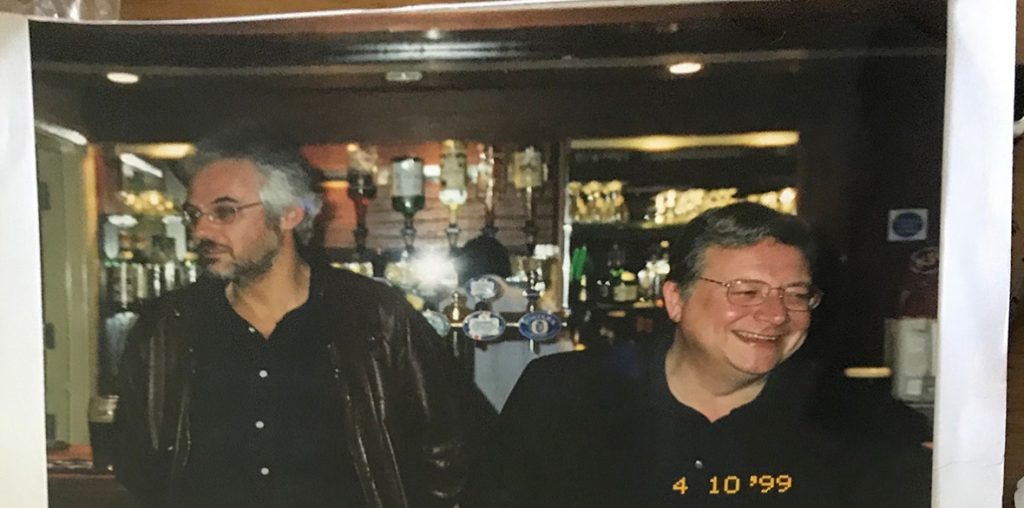This article originally appeared in the Morning Star.
GRAHAM STEVENSON was born in the mining village of Keresley, near Coventry, on October 28 1950, the younger of two children.
His mother Nora (“Dink”), who had been a textile worker, died tragically when Graham was 15.
His father, Ernest, was an engineer and a lifelong trade unionist, becoming AEU convener at Smiths Industries Coventry plant.
His brother David, six years older, remembers Graham at primary school as a precocious reader and writer, editing a newsletter when he was eight.
Graham won a place at the King Henry VIII School and took his left politics into a strongly conservative middle-class institution.
Graham strengthened his arguments by reading Labour Research, which his father brought home from his convener’s office and also the Daily Worker, which he bought out of his lunch money.
He was soon enthused by accounts of James Klugmann’s Christian Marxist dialogue and, aged 15, was already running into trouble with right-wing teachers.
His 1965 Christmas present was, as requested, Bukharin’s ABC of Communism (the following year it was Joan Robinson’s Economic Philosophy).
By then Graham had joined and revived the previously moribund Coventry YCL.
Many of his recruits were among fellow school students and on a sufficient scale for the headmaster, after failing to force Graham to reveal names, to put pressure on his father to withdraw him from the school just prior to taking the Oxford/Cambridge entrance examinations.
There followed a difficult period in which Graham tried to combine studying for A levels at technical college, undertaking gainful employment, finding places to stay and also working more or less full time for the Coventry Communist Party and YCL.
This ultimately resolved itself with Graham living in the Coventry party premises and acting as an unpaid full-timer at the same time as passing through a succession of jobs in the local engineering industry — in one case designing, as a technical draftsman, a lockable petrol tank cap that is still in use.
By 1970 he was secretary of the Coventry Trades Council youth committee, by 1971 a member of the Coventry Communist Party city committee and 1972 of the Midlands district committee — at the same time as holding national positions in the YCL.
In 1973 he joined a work brigade in Cuba and later, as building workers began to mobilise for strike action around the Building Workers’ Charter, he joined Ucatt and, along with fellow communist and building-trade activist Pete Carter, sought to unionise local building sites.
A clash with the management on one site, and an attempt at an occupation, led to the famous Rotunda legal case.
Graham and his colleagues were arrested months after the event and charged with conspiracy to trespass, with potentially unlimited penalties.
Their trial preceded that of the Shrewsbury Five, but on this occasion, with a sympathetic Birmingham jury led by a local union convener, the accused were found not guilty. The Shrewsbury trial was shifted to Chester.
By this time Graham had moved from Coventry to Birmingham and was working closely with the Birmingham Communist Party city secretary Frank Watters, previously an NUM activist legendary for his work in the Yorkshire coalfield.
Together Frank and Graham redeveloped the party’s premises into a social club, pioneering reggae, which soon became a home for many in the local black community, including Bill Morris, future general secretary of the TGWU.
In this work, Graham also worked closely with Frank’s daughter, Lesley, who he married in 1979.
By then Graham was employed at the BSA factory in Birmingham, becoming a TGWU steward and actively involving himself in the work of the union in the West Midlands.
In 1980 he applied for the post of district organiser for the TGWU in Derby and began his career as a full-time trade-union officer.
In Derby he gained fame for reunionising a number of the bus services and taking the union strongly into wider community activity — particularly leading the way in re-establishing CND locally and in 1981 and 1982 building a mass movement among local youth against unemployment with the Derbyshire March for Jobs in 1981 and becoming organiser for the Midlands March for Jobs in 1982.
He ensured that transport drivers gave full support to the miners in 1984-85 as well as himself speaking beside Arthur Scargill at numerous meetings in the Midlands.
It was in this period also that Graham emerged as an integral figure in drawing together the TGWU left at national level.
In 1988 he moved on to become national secretary for passenger services.
Martin Mayer recalls walking into the grand wood-panelled council chamber in the old Transport House in 1992 as a new delegate on the passenger services national committee and the detailed support and assistance he received.
“Graham grasped the magnitude of the threat posed to members’ wages and conditions by Tory bus deregulation and possessed the strategic understanding needed to counter it.
“He reorganised the membership into national groups matching the new privately owned bus companies and took on the companies in areas where they were most exposed, transforming union morale and membership density.”
In 1999 Graham became TGWU national secretary for the whole of transport.
Richard Crease, recently vice-chair of the United Left in Unite, remembers Graham’s impact when he joined the national committee as chair of the docks & waterways national trade group.
“Graham supported people personally. He had an aura of optimism. He gave me the confidence to become the docks and waterways representative on the European Transport Workers Federation and later the international federation.”
By that time Graham himself was playing a leading role in both organisations, having helped to create the European federation after the collapse of its predecessor and playing a critical role in consolidating a progressive left leadership in the international federation.
As president of the European federation, Graham ensured that it became a militant organisation co-ordinating actions across the continent to defend members’ interests — most notably the strikes across Europe’s docks in January 2003 which forced the abandonment of the EU Commission’s directive seeking to introduce privatisation.
The tribute from Steve Cotton, general secretary of the International Transport Workers’ Federation (ITF), is carried elsewhere in the Star, but he stresses the importance of Graham’s international role: “In the ETF, he was instrumental in shaping the policy framework of the organisation from its foundations in 1999.
“He was a true internationalist whose network of unionists stemmed far beyond the UK, let alone his own union.
“And as a strong advocate of the ITF, he convinced unions to join our federation, including the American Service Employees Union, when they were seeking assistance from the T&G in their dispute against an anti-union British multinational.”
These were also the years in which Graham played a central role in consolidating the broad left in the TGWU, helping to ensure that the union maintained its opposition to the worst excesses of New Labour, personally clinching its vote to oppose the Iraq war, and a few years later in creating a united left during the difficult negotiations that eventually saw the TGWU merge with Amicus to form Unite.
It was Graham who drew up the aims and objectives of the new united left that has played an essential role in carrying forward the socialist traditions of Frank Cousins, Jack Jones and Hugh Scanlon.
Graham was, stresses Martin Mayer, “a tour de force in the TGWU and later Unite leadership; a strategist, an organiser and a redoubtable fountain of knowledge and political thinker.”
Graham played a similar role in the Communist Party during the difficult years of the 1980s, where he worked for unity among the trade union forces opposed to euro-communism.
He was for many years a member of the executive and political committee of the Communist Party of Britain and became its fourth trade-union organiser following Kevin Halpin, Carolyn Jones and Anita Halpin.
Anita Halpin writes: “Graham brought a new dimension to the role with his international experience at the ETF and ITF and developed the trade union co-ordinating committee (a cross-industry advisory) introduced by Jones and did a meticulous job to gather data on where members worked to develop industrial advisories and establish new ones.
“Under Stevenson’s leadership, Unity, the bulletin for trade unionists, extended its range and produced daily editions, not only at the TUC but also at Unite policy conferences.”
In this work, and in many other areas, his son Ben and daughter Joanne provided invaluable help as Graham also assisted them in developing their skills and careers.
Ben became national organiser for the Communist Party and Joanne a general secretary of the YCL.
After his retirement from Unite in 2010, Graham turned his energies towards the Midlands district of the Communist Party, where he was district secretary until his death, and stood as mayoral candidate for the West Midlands, receiving just under 6,000 votes.
He served as treasurer for the Marx Memorial Library from 2013 to 2019, and during his final year was helping to redevelop the trade-union base of Liberation as deputy to Maggie Bowden.
He also found the time to indulge his passion for the history of the working-class movement, adding to his monumental work of communist biography, writing his daily column for the Morning Star and redeveloping the Communist Party history group and its periodical, Our History.




